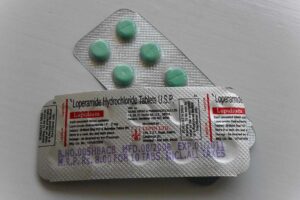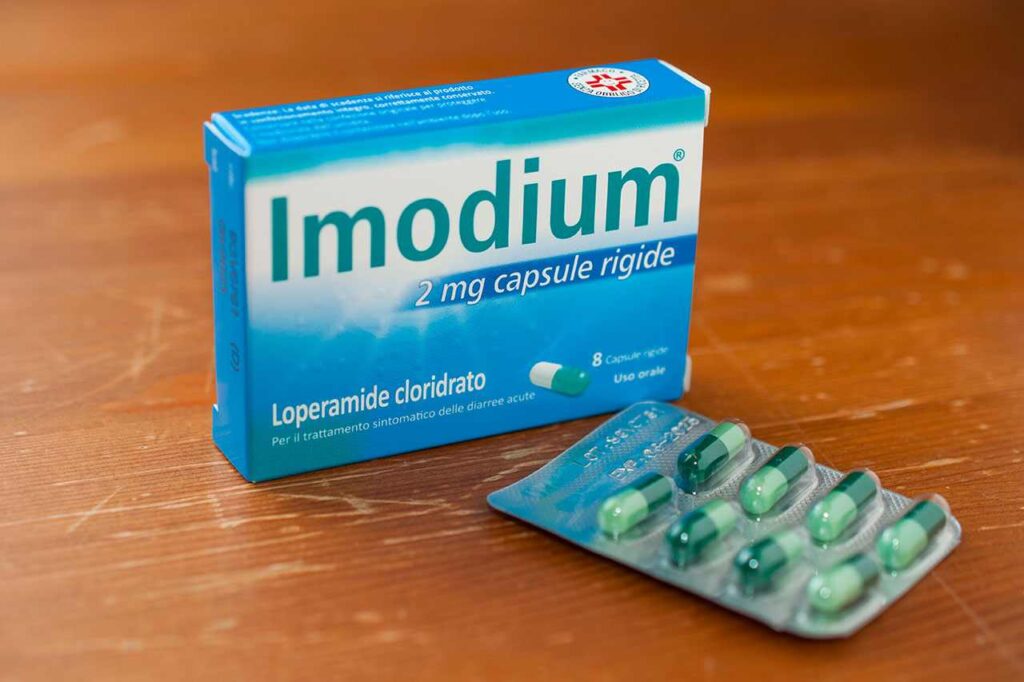Imodium, commonly known for its active ingredient loperamide, is widely used to manage diarrhea. However, its accessibility and opioid-like effects at high doses have led to its misuse and potential for addiction. This blog explores the phenomenon of Imodium addiction, shedding light on how it occurs, its risks, and effective ways to address this often-overlooked issue.
Contents
What Is Imodium Addiction?
 Imodium addiction refers to the compulsive misuse of the over-the-counter medication Imodium. It contains loperamide, a substance originally intended to treat symptoms of diarrhea. While safe at recommended dosages, Imodium can produce opioid-like effects when taken in excessive amounts, leading to its misuse by individuals seeking these effects.
Imodium addiction refers to the compulsive misuse of the over-the-counter medication Imodium. It contains loperamide, a substance originally intended to treat symptoms of diarrhea. While safe at recommended dosages, Imodium can produce opioid-like effects when taken in excessive amounts, leading to its misuse by individuals seeking these effects.
This type of addiction is particularly concerning because it often starts with a legitimate medical need. However, it can escalate to dangerous levels of consumption as tolerance to the drug’s effects increases.
The term “addiction” in the context of Imodium is characterized by both psychological and physical dependency on the drug. Individuals addicted to Imodium may feel an uncontrollable urge to continue using the drug despite adverse health consequences and significant disruptions to their daily lives.
What Happens If You Constantly Take Imodium?
Constant use of Imodium (loperamide) beyond recommended doses can lead to several health problems, both short-term and long-term:
- Constipation: Imodium is designed to slow intestinal movement to treat diarrhea. Overuse can lead to severe constipation, which may become chronic and require medical intervention.
- Abdominal Pain and Distress: Prolonged use can cause severe abdominal cramping, bloating, and discomfort due to disrupted bowel function.
- Nausea and Vomiting: These can occur as side effects of excessive loperamide use, especially as the body reacts to irregular bowel movements.
- Heart Problems: High doses of Imodium can cause serious heart rhythm problems or cardiac arrest. These effects arise because loperamide can alter the electrical activity of the heart, leading to arrhythmias.
- Central Nervous System Effects: Although less common, misuse at very high doses can lead to drowsiness, dizziness, and even fainting.
- Dependency and Withdrawal: With regular overuse, individuals may develop a dependency on Imodium to regulate bowel movements. Stopping suddenly can lead to withdrawal symptoms such as abdominal cramps, nausea, and diarrhea.
- Immune System Impairment: Chronic misuse might impact the body’s immune response, particularly in the intestines. These are a critical part of the immune system.
Using Imodium responsibly and only as directed is crucial to avoid these potential health risks. If there’s a need to use this medication regularly or in higher doses, it’s important to consult a healthcare provider.
Why Do Doctors Not Recommend Imodium?
 Doctors typically recommend Imodium (loperamide) for short-term relief of diarrhea. But there are several reasons why they might advise against its use in certain situations:
Doctors typically recommend Imodium (loperamide) for short-term relief of diarrhea. But there are several reasons why they might advise against its use in certain situations:
- Underlying Conditions
Imodium only treats the symptoms of diarrhea, not the underlying cause. If diarrhea is due to an infection like bacteria or parasites, or a chronic condition like inflammatory bowel disease, treating it with Imodium without addressing the cause can exacerbate the condition.
- Risk of Misuse and Overdose
Due to its opioid-like effects at high doses, there’s a risk of misuse and overdose. Doctors might be cautious in recommending it to patients with a history of substance abuse.
- Side Effects
Imodium can cause side effects such as constipation, abdominal pain, and in rare cases, severe heart problems, especially when used inappropriately.
- Children and Elderly
Imodium is generally not recommended for young children or elderly patients without medical supervision, as these groups are more susceptible to its adverse effects.
- Pregnancy and Breastfeeding
The safety of Imodium during pregnancy and breastfeeding is not fully established, so doctors may advise against its use or recommend it only under close supervision.
- Drug Interactions
Imodium can interact with other medications, potentially leading to dangerous side effects or decreased effectiveness of other treatments.
- Immune System Impact
Regular use might negatively affect the gut’s immune function. This can be problematic, especially for individuals with weakened immune systems.
For these reasons, doctors typically recommend using Imodium judiciously and consulting a healthcare provider if there’s a need for prolonged use or if the cause of diarrhea is unclear.
How To Prevent Imodium Addiction?
Preventing Imodium addiction involves a combination of education, responsible usage, and monitoring. Here are some key strategies to help prevent the misuse and potential addiction to Imodium:
- Follow Dosage Instructions: Always use Imodium according to the dosage instructions on the label or as prescribed by a healthcare provider. Do not exceed the recommended amount or duration of use.
- Educate About Risks: Awareness of the risks associated with the overuse of Imodium, including potential cardiac issues and dependency, is crucial. Educating patients on the proper use and possible dangers can discourage misuse.
- Monitor Use: For individuals who have a history of substance misuse or are at risk of addiction, monitoring by healthcare professionals or family members can help ensure that Imodium is used appropriately.
- Treat Underlying Conditions: Addressing the root causes of diarrhea, whether they are infections, chronic diseases, or dietary issues, can reduce the need to use Imodium frequently or inappropriately.
- Use Alternatives When Appropriate: Depending on the cause and severity of diarrhea, other treatments may be safer or more effective. Probiotics, hydration solutions, and dietary adjustments can sometimes manage symptoms without the risks associated with Imodium.
- Consult Healthcare Providers Regularly: Regular consultations with healthcare professionals can ensure that any ongoing issues with diarrhea are managed appropriately and that the use of Imodium is still justified.
- Limit Access if Necessary: For those particularly at risk, limiting access to large quantities of Imodium can prevent the temptation or ability to misuse the drug.
By implementing these strategies, individuals can reduce the risk of becoming dependent on Imodium while safely managing symptoms of diarrhea.
When Should I Seek Medical Treatment For Imodium Addiction?
 Seeking medical treatment for Imodium addiction is crucial when you notice signs of misuse or dependence, especially if your usage is affecting your health or daily life. Here are specific situations when it’s important to seek professional help:
Seeking medical treatment for Imodium addiction is crucial when you notice signs of misuse or dependence, especially if your usage is affecting your health or daily life. Here are specific situations when it’s important to seek professional help:
1. Exceeding Recommended Dosages
If you find yourself consistently taking more than the recommended dose of Imodium to achieve relief or for reasons other than diarrhea management, it’s a sign that you should seek help.
2. Physical Dependency
If you experience withdrawal symptoms such as abdominal pain, diarrhea, or nausea when you try to stop using Imodium, it indicates a physical dependency.
3. Health Complications
Symptoms like constipation, severe abdominal pain, changes in heartbeat, or any other unusual health issues should prompt immediate medical attention, as these can indicate serious complications from overuse.
4. Psychological Dependence
Feeling a compulsive need to use Imodium, even in the absence of diarrhea symptoms, or using it to feel “normal” suggests psychological dependence.
5. Impact on Daily Life
If the use of Imodium starts to interfere with your social, professional, or daily activities, it’s a clear indicator that you need professional intervention.
6. Ineffective Self-Control
If you’ve tried to reduce your use of Imodium on your own but have been unsuccessful, professional help can provide the support and strategies needed for effective management and recovery.
7. Concerns From Others
If family members, friends, or coworkers express concerns about your use of Imodium, it might be time to evaluate your usage patterns and consider seeking help.
In these situations, consulting a healthcare professional can provide a clear assessment and guide you toward appropriate treatment options, which may include therapy, medication management, or referral to specialized addiction services. It’s important to address this issue early to prevent further health risks and complications.
Conclusion
In conclusion, while Imodium is a valuable medication for managing diarrhea, it’s important to use it responsibly to avoid the risks of addiction and other health complications. If you find yourself using Imodium more frequently or in larger amounts than recommended, or if you experience any adverse effects or dependency symptoms, it’s crucial to seek professional help.
Addressing the misuse of Imodium early with the guidance of healthcare professionals can prevent serious health issues and help maintain your overall well-being. Remember, the key to safe medication use is adherence to guidance and being aware of the signs that indicate a need for medical intervention.
